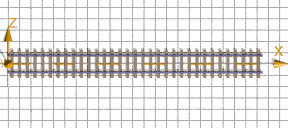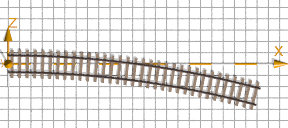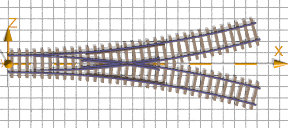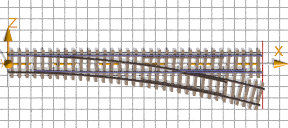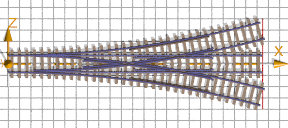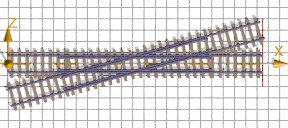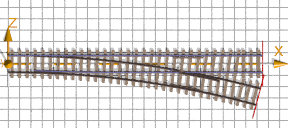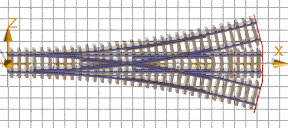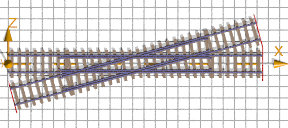Home
- POV-Ray Tutorial
Model Railroading
Railway Modelling
with POV-Ray
Index of Content
- Rail Track System
for POV-Ray
Basic Track Elements
- Straight & Curved
- Switches
- Wye + 3Ways
- Level Junctions
- Simplified Using by
RT_System_00.inc
> Rail Tracks Elements
with RT_System_00.inc
- Track Layout with
Model Scaled Tracks
- H0 Scale Tracks
- N Scale Tracks
- Z Scale Tracks
- Track Layout with
scaled Tracks
- Track Placement
- Tracks Up & Down
- Track Layout Examples
- Simple cyclic
- Simple eight
- Download of the
Rail Track System
|
To activate the following objects,
we have to add:
Note: We have to include this only one time!
|
#include "RT_System/RT_System_00.inc" |
|
|
RT_Track_Straight_0
|
object{ RT_Track_Straight_0( 0, // Simulation_Type,
22.5,// Track_Length, meter
1.5, // Ties_Per_Meter
) //-------------------------
scale<1,1,1> rotate<0,0,0>
translate<0.00,0.00,0.00>
} //--------------------------------------------------// |
|
|
RT_Track_Curve_0
|
object{ RT_Track_Curve_0( 0, // Simulation_Type,
85.00 // Curve_Radius, meter
15, // Curve_Angle, degrees
1.5, // Ties_Per_Meter
) //-------------------------
scale<1,1,1> rotate<0,0,0>
translate<0.00,0.00,0.00>
} //--------------------------------------------------// |
For a curve to the left use ' scale<1,1,-1>' .
|
|
RT_Track_Switch_Y_0
|
object{RT_Track_Switch_Y_0(
0, // Simulation_Type,
0, // Direction: 0=right, 1=curve
85.00, // Switch_Radius, meter
15, // Switch_Angle, degrees
1.5, // Ties_Per_Meter
) //-------------------------
scale<1,1,1> rotate<0,0,0>
translate<0.00,0.00,0.00>
} //--------------------------------------------------// |
|
Turnouts + Level Junctions /
Switches + Diamond Crossings
Type A:
|
For the positions in a track layout useful:
#declare Switch_Length = 22.50 ;
#declare Switch_Angle = 15 ;
#declare Switch_Radius =
Switch_Length/(sin(radians(Switch_Angle)));
#declare Rail_Distance =
2*Switch_Radius*(1-cos(radians(Switch_Angle))); |
|
|
RT_Track_Switch_A_0
|
object{ RT_Track_Switch_A_0(
0, // Simulation_Type,
0, // Direction: 0 = straight, 1 = right
22.50, // Switch_Length, meter
15, // Switch_Angle, degrees
1.5, // Ties_Per_Meter
) //-------------------------
scale<1,1,1> rotate<0,0,0>
translate<0.00,0.00,0.00>
} //--------------------------------------------------// |
For a left switch use ' scale<1,1,-1>' .
|
|
RT_Track_Switch_3Ways_A_0
|
object{ RT_Track_Switch_3Ways_A_0(
0, // Simulation_Type,
0, // Direction: 0=straight, 1=right, 2=left
22.50, // Switch_Length, meter
15, // Switch_Angle, degrees
1.5, // Ties_Per_Meter
) //-------------------------
scale<1,1,1> rotate<0,0,0>
translate<0.00,0.00,0.00>
} //--------------------------------------------------// |
|
RT_Track_Level_Junction_0
for switch type A
|
#declare Crossing_Angle = 15;
#declare Main_Length = 22.50 ;
#declare End_Distance =
Main_Length*tan(radians(Crossing_Angle));
#declare Cross_Length =
sqrt(pow(Main_Length,2)+pow(End_Distance,2));
//----------------------------------
object{ RT_Track_Level_Junction_0(
0, // Simulation_Type,
0, // Direction: 0 = straight, 1 = right
Crossing_Angle, // degrees
Main_Length, // meter
Cross_Length, // meter
1.5, // Ties_Per_Meter
) //-------------------------
scale<1,1,1> rotate<0,0,0>
translate<0.00,0.00,0.00>
} //--------------------------------------------------// |
For a level junction to the other side use '-Crossing_Angle' .
|
Turnouts + Level Junctions /
Switches + Diamond Crossings
Type B:
|
For the positions in a track layout useful:
#declare Switch_Length = 22.50 ;
#declare Switch_Angle = 15 ;
#declare Switch_Radius =
Switch_Length/( 2*tand(Switch_Angle/2));
#declare Rail_Distance =
2*Switch_Radius*(1-cosd(Switch_Angle));
#declare L1 = Switch_Length;
#declare Bow_Len = Switch_Radius * sind( Switch_Angle);
#declare Len_Diff = L1-Bow_Len;
#declare L2= L1 - 2* Len_Diff;
|
|
|
RT_Track_Switch_B_0
|
object{ RT_Track_Switch_B_0(
0, // Simulation_Type,
0, // Direction: 0=straight, 1=right, 2=left
22.50, // Switch_Length, meter
15, // Switch_Angle, degrees
1.5, // Ties_Per_Meter
) //-------------------------
scale<1,1,1> rotate<0,0,0>
translate<0.00,0.00,0.00>
} //--------------------------------------------------// |
For a left switch use ' scale<1,1,-1>' .
|
|
RT_Track_Switch_3Ways_B_0
|
object{ RT_Track_Switch_3Ways_B_0(
0, // Simulation_Type,
0, // Direction: 0=straight, 1=right, 2=left
22.50, // Switch_Length, meter
15, // Switch_Angle, degrees
1.5, // Ties_Per_Meter
) //-------------------------
scale<1,1,1> rotate<0,0,0>
translate<0.00,0.00,0.00>
} //--------------------------------------------------// |
|
|
RT_Track_Level_Junction_0
|
object{ RT_Track_Switch_B_0(
0, // Simulation_Type,
15, // Crossing_Angle, degrees
85.00, // Main_Length, meter
85.00, // Cross_Length, meter
1.5, // Ties_Per_Meter
) //-------------------------
scale<1,1,1> rotate<0,0,0>
translate<0.00,0.00,0.00>
} //--------------------------------------------------// |
|
|

